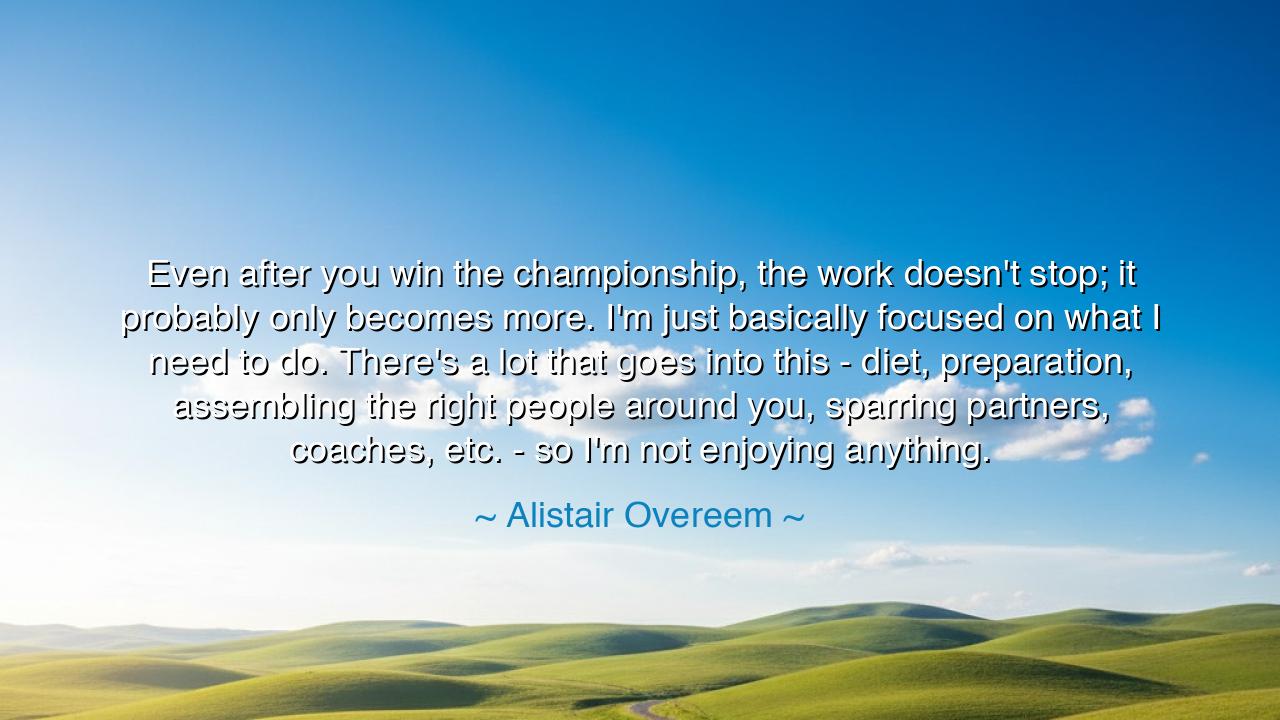
Even after you win the championship, the work doesn't stop; it
Even after you win the championship, the work doesn't stop; it probably only becomes more. I'm just basically focused on what I need to do. There's a lot that goes into this - diet, preparation, assembling the right people around you, sparring partners, coaches, etc. - so I'm not enjoying anything.






"Even after you win the championship, the work doesn't stop; it probably only becomes more. I'm just basically focused on what I need to do. There's a lot that goes into this - diet, preparation, assembling the right people around you, sparring partners, coaches, etc. - so I'm not enjoying anything." These words, spoken by Alistair Overeem, carry the weight of a profound truth about success and commitment. They remind us that the path to greatness is not one of fleeting enjoyment or idle celebration, but a continuous journey of relentless work, preparation, and discipline. The notion that the work only increases after success is an idea as old as time, a truth echoed by warriors, philosophers, and leaders throughout history.
In the ancient world, heroes like Hercules and Achilles were not defined by their victories alone, but by the grueling trials and relentless discipline they endured before and after each conquest. Hercules, famous for completing the Twelve Labors, did not rest once he achieved victory. Each success was followed by new challenges, greater tasks, and ever more difficult trials. Like Overeem, these ancient warriors understood that greatness is not a destination, but a path of constant striving and sacrifice. Victory in battle or in sport does not grant freedom from effort; it only raises the stakes, demanding even more dedication and focus.
Consider the example of Alexander the Great, whose military conquests spanned continents. After his monumental victories, he did not rest on his laurels. Instead, he continued to build his empire, strategize, and prepare for new battles. His diet, his training, and the team around him—all were crucial to his success. Alexander surrounded himself with the best advisors, generals, and tacticians, understanding that his success depended not just on his own abilities, but on the collective strength of those who stood with him. Overeem’s words echo the ancient wisdom that no victory is final, and that success requires constant work, preparation, and collaboration.
The ancient Greeks also understood this truth in their approach to the Olympic Games. Athletes, though victorious, would not rest long after winning, for the next competition was always looming. Their diet and training regimens were designed not just to prepare them for a single contest, but to ensure they were ready for whatever challenges lay ahead. Much like Overeem, these athletes recognized that victory was not an end, but a continual process of striving toward excellence. Success was a series of steps, each one building upon the last, with no room for complacency.
Overeem’s words also reflect the philosophical teachings of Stoicism, especially as articulated by Epictetus and Marcus Aurelius. The Stoics believed that life’s true fulfillment comes not from pleasure or rest, but from living with purpose, continuously improving, and contributing to the world around us. Marcus Aurelius, though emperor, lived with the understanding that his work was never truly done. Every victory, every success was but a step toward greater responsibility, greater duty, and greater commitment. For the Stoics, true strength lies in the ability to maintain focus, to continually engage in self-discipline, and to be prepared for whatever challenges arise.
The lesson here is clear: success is not the culmination of effort, but the beginning of an even greater responsibility. Like Overeem, who continues to train and prepare despite his accomplishments, we must understand that victory, whether in our careers, relationships, or personal development, does not grant us permission to rest. It demands more. It requires deeper commitment, greater discipline, and a mindset that does not see challenges as obstacles, but as opportunities to refine our craft and push forward with greater purpose.
To live a life of excellence, we must learn to embrace the journey, not the destination. Like the ancient heroes, we must understand that victory is but a temporary resting point on a long, hard road. The work is never done, and every accomplishment demands more of us. In practical terms, this means committing to a life of daily improvement—whether through physical training, mental preparation, or the building of strong relationships. Victory in any form—whether personal, professional, or spiritual—requires constant focus, preparation, and dedication.
Thus, let us take Overeem's words and the ancient wisdom they reflect to heart. Let us embrace hard work, discipline, and focus as the true keys to success. Whether we are preparing for a competition, a goal, or a challenge, we must remember that the journey never ends. Every victory requires further preparation, and every success is a call to continue striving with purpose and commitment. Only through this relentless pursuit of excellence can we truly honor the gifts we have been given and fulfill our greatest potential.






AAdministratorAdministrator
Welcome, honored guests. Please leave a comment, we will respond soon